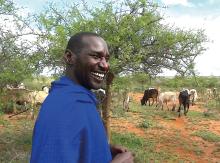Land Library
Welcome to the Land Portal Library. Explore our vast collection of open-access resources (over 74,000) including reports, journal articles, research papers, peer-reviewed publications, legal documents, videos and much more.
/ library resources
Showing items 1 through 9 of 17.There has been progress in terms of legislation of land ownership and women rights on the same subject in Kenya and a number of Non-Governmental Organizations and Civil Society Organizations are in the fore front promoting women land ownership.
The year 2016 marks 15 years since the new wave land reforms became operational in Tanzania. Despite its ambitious goals – encouraging land registration and titling, and empowering women and other vulnerable groups – the results are disillusioning.
This paper discusses the major challenges women in Kenya face as they try to ensure and maintain food security at the household level.
It would be difficult to imagine the diet of the local consumers around Lake Victoria without the silver cyprinid. The small fresh water sardine also plays an important role in women’s participation in Kenya’s fishery sector.
During the last few years, the donor community has increased its efforts to reduce the large amounts of fish lost in the distribution chain in artisanal fishery, an endeavour that ought to be welcomed in principle.
In Africa, as elsewhere, land rights have remained a bastion of male power and privilege.
Despite the crucial role of women in family farms and small-scale agriculture, gender inequality is still present in many ways – jeopardising the food and nutrition security of millions of people.
The Government extension services in Papua New Guinea (PNG) are weak. There is a general lack of money and staff, and the country has a poor infrastructure. Above all small-scale farmers in remote areas are left out of developments.
Publicly elected women representatives in India ought to take advantage of their influence to defend women’s rights.








